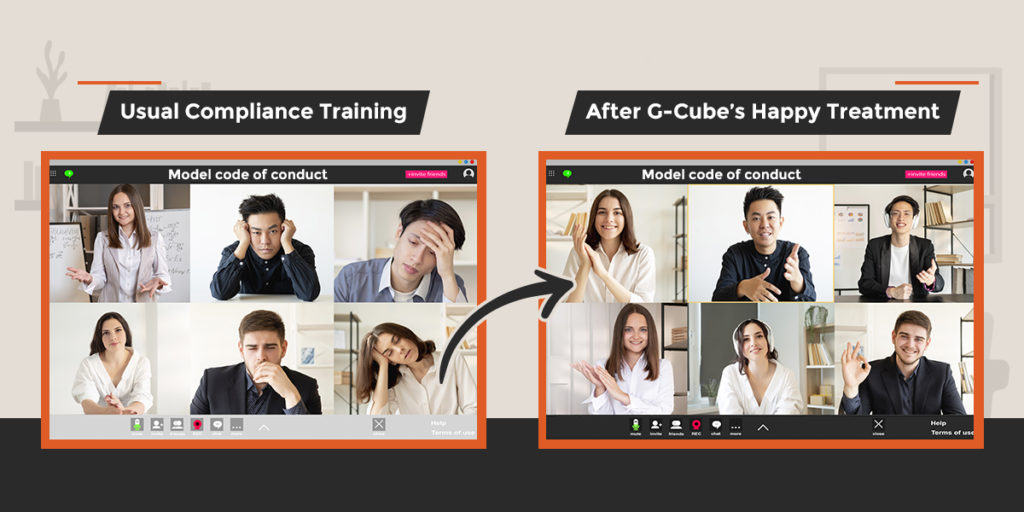This happened about 18 months ago.
It was a memorable day at G-Cube as everyone was excited to be part of this incredible deal, as the sales team had won a contract to develop an e-learning course that would last an hour.
One would ask the question, “What is the big deal?” The big deal is that the client approved a budget of $200,000 for a one-hour course, which is about four times more than what G-Cube normally charges for an excellent e-learning course.
Surprisingly, it was a course on compliance and ethics, which is the category of training that is usually treated as, “Cross off this Item on the list and move on”.
Building a masterpiece
The course took a few months to establish and was unrivaled as it had the best technology, originality, instructional design principles and experts involved in the course. The latest up-to-date cameras and ideal locations were used to shoot the videos. Money was not an issue and any ideas that could have a positive impact on the course were executed with perfection.
The entire G-Cube team worked hand in glove with some of the world’s most brilliant minds on teaching compliance and practicing zero tolerance on non-compliance, without compromising quality.

The expected learning outcome was simple—the customer-facing employees must adhere to the code of conduct and the ethics and integrity principles—even over and above their performance goals.
While we celebrated, many of us had questions about the financial wisdom of the client’s L & D team, as we were willing to develop four courses within the budget with a similar result; but they insisted on one course.
After a few months of implementation, the reports from the client indicated that the course had a profound impact on how the employee took ethical and integrity decisions. We were happy but always questioned the amount invested for a compliance e-learning course.
The Epiphany
I had my epiphany when I read this news on the BBC— “McKinsey agrees to $573 million opioid settlement in US”.
To know more about Opioid Crisis read this report from Indian Express. Indian Express reports, “The consulting firm McKinsey came under scrutiny for its advice it gave to Purdue Pharma, whose painkiller drug, OxyContin, authorities said, was among those that worsened the opioid crisis. Prosecutors accused McKinsey of advising the Sacklers, the wealthy family that owns Purdue Pharma, on how to ‘turbocharge’ opioid sales, even as the effects of the opioid epidemic had become clear.”
McKinsey, a great organization, has a solid learning culture and boasts of a highly inspiring code of professional conduct
The five elements of McKinsey’s code are:
- Serving our clients with the highest professional standards.
- Creating a working environment that inspires and motivates our people
- Fulfilling our responsibility to society
- Managing risk to the firm
- Seeking advice and raising concerns
Knowingly or unknowingly, some of the employees did not adhere to this code of conduct whilst consulting with Purdue Pharma, which would have raised red flags before the crisis developed.
Was it an organization failure or an individual leader’s mistake? For a large organization that has more than 33,230 employees and a large extended workforce, ensuring all employees adhere to “The Code of Professional Conduct”, and to ensure they absorb the reason for the code of conduct and imbibe it in the employees’ culture and behavior, will be a huge challenge.
I am sure that McKinsey executives responsible for this exacerbation have read the “Code of Conduct” but do not put it into practice on a regular basis.
It is evident that the training and learning interventions, and the empowerment strategy of the code of conduct, could not help them bolster its value and make them aware of the risks involved in not complying with the code.
The lesson we learnt
To write the code over nine pages and have effective training are not nearly enough, as high-risk compliance needs the best training and learning in place.
Hence the reason why our client invested $200,000 on a compliance course to safeguard the company from errors that can affect hundreds of lives and result in penalties that can be as high as $600 million.
If you want to know more about the approach used in developing this compliance learning course, please feel free to contact G-Cube at in**@gc**********.net.








